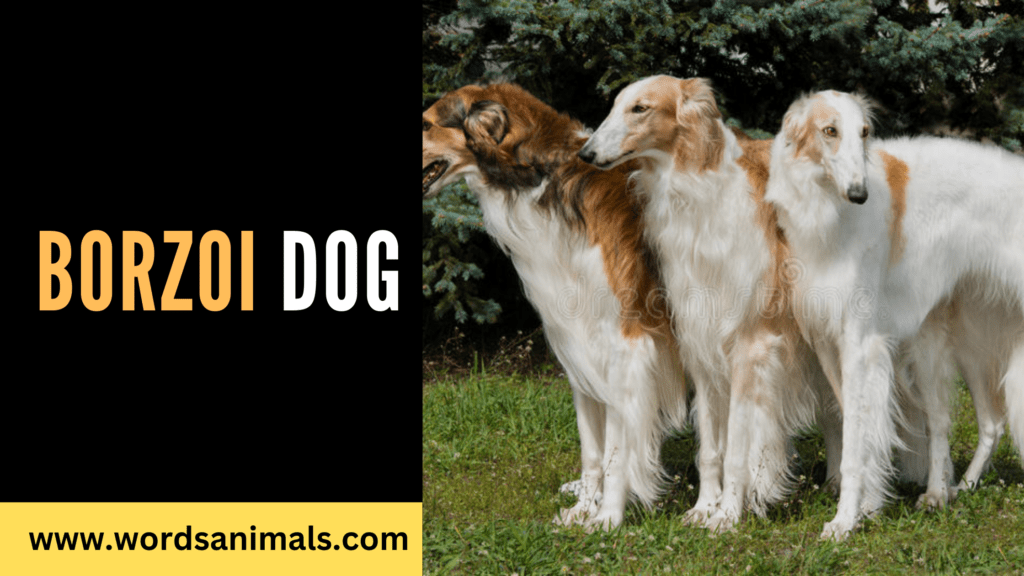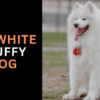The borzoi dog, also famous as the Russian Wolfhound, developed in Russia. Borzoi dogs breed originally bred by Russian nobility for hunting wolves and other large game.
Borzoi dogs are known for their elegance, grace, and speed. They have a long, narrow head with a long muzzle, almond-shaped eyes, and long, floppy ears. They have muscular, slender bodies with long, curved tails.
Borzoi dogs are typically calm and quiet, but they can be reserved and aloof around strangers. They are intelligent and independent, but they can also be stubborn and difficult to train
Borzoi dog have a medium-length, silky coat that requires regular brushing to keep it clean and free of tangles. They come in a variety of colors, including white, black, gray, fawn, and brindle borzoi dog.
There Are the Top 5 Diseases in Borzoi dogs:
Gastric Torsion (Bloat):
This is a serious condition that can occur when the stomach twists and fills with gas, causing a life-threatening obstruction. Signs of bloat include restlessness, pacing, and a distended abdomen. It is essential to seek immediate veterinary care if you suspect your Borzoi is suffering from bloat.
Heart Disease:
Borzoi dog are prone to certain types of heart disease, such as dilated cardiomyopathy (DCM). This condition can cause the heart to enlarge and weaken, leading to heart failure. Signs of heart disease may include coughing, exercise intolerance, and difficulty breathing.
Hypothyroidism:
This is a common endocrine disorder that occurs when the thyroid gland does not produce enough hormones. Signs of hypothyroidism in Borzoi dogs may include weight gain, lethargy, and skin problems.
Hip Dysplasia:
This is a genetic condition that affects the hips, causing pain and mobility issues. Signs of hip dysplasia may include lameness, reluctance to move, and difficulty getting up from a lying position.
Osteosarcoma:
This is a type of bone cancer that can affect large breed dogs like the Borzoi. Signs of osteosarcoma may include limping, swelling, and pain in the affected limb.
How to overcome these diseases?
Gastric Torsion:
To prevent bloat, it is essential to feed your Borzoi small, frequent meals rather than one large meal per day. Avoid feeding your dog right before or after exercise, and make sure they have access to fresh water at all times. Additionally, your veterinarian may recommend a gastropexy procedure, which can help prevent the stomach from twisting.
Heart Disease:
Treatment may involve medications to manage symptoms, such as diuretics and ACE inhibitors. In some cases, surgery may be necessary to correct the structural irregularity.
Hypothyroidism:
If your Borzoi is diagnosed with hypothyroidism, they may require lifelong thyroid hormone replacement therapy. This medication can help manage symptoms and prevent complications.
Hip Dysplasia:
Although hip dysplasia is a genetic condition, there are steps you can take to manage it. Regular exercise can help maintain muscle mass and joint mobility. Additionally, your veterinarian may recommend supplements or medications to manage pain and inflammation.
Osteosarcoma:
Early detection is crucial for the treatment of osteosarcoma. If you notice any signs of limping, swelling, or pain in your Borzoi’s limbs, seek veterinary care right away. Treatment may involve surgery, chemotherapy, and pain management.
Conclusion:
Borzoi dogs are a wonderful breed known for their grace, intelligence, and affectionate nature. As with any breed, they may be susceptible to certain health issues, such as gastric torsion, heart disease, hypothyroidism, hip dysplasia, and osteosarcoma. However, with regular veterinary care and preventative measures, these health issues can be managed or prevented altogether. Additionally, Borzoi dogs make great companions for families with children, but it is important to supervise interactions to ensure safety. With proper exercise, grooming, and training, Borzoi dogs can be a wonderful addition to any loving home.
FAQs:
Are Borzoi dogs good with children?
Borzoi dogs can be great with children when socialized and trained properly. They are generally gentle and patient, but they can be sensitive to rough handling or loud noises. As with any breed, it is important to supervise interactions between dogs and children to ensure safety for both.
How much exercise do Borzoi dogs need?
Borzoi dogs have a moderate energy level and require regular exercise to stay healthy and happy. They enjoy daily walks or jogs and benefit from regular opportunities to run and play in a fenced yard or another safe area. However, it is important to avoid overexertion, particularly in hot weather, as Borzoi dogs are susceptible to heatstroke.
Are Borzoi dogs easy to train?
Borzoi dogs are intelligent but independent, which can make training a challenge. They respond well to positive reinforcement techniques and gentle, patient training methods. However, they can be stubborn and require consistent, ongoing training to maintain good behavior.
Are Borzoi dogs good with other pets?
Borzoi dogs have a high prey drive and were originally bred for hunting, so they may not be compatible with smaller pets such as cats, rabbits, or rodents.



